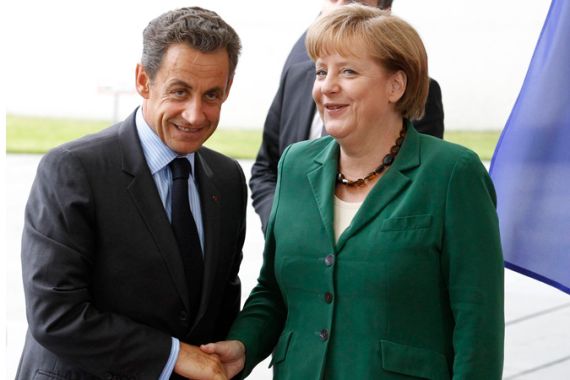Euro leaders meet to discuss Greek bailout
Eurozone leaders begin crucial talks to help Greece overcome the debt crisis which could affect the rest of Europe.

Eurozone leaders have gathered in Brussels for a crucial summit to find a way out of the Greek debt crisis.
Emergency loans for Athens are among the proposals to be discussed at Thursday’s meeting.
The new bailout would supplement a 110 billion euro ($156bn) rescue plan for Greece launched in May last year.
It is expected to include fresh emergency loans to Athens from eurozone governments and the International Monetary Fund, and a contribution by private sector investors.
Europeans leaders have been struggling to find an agreement that makes sure that banks and other private investors help pay for a bailout, without triggering panic on financial markets that the crisis could spread to larger economies like Spain or Italy.
The summit comes hours after Germany and France, the eurozone’s two largest economies, reached a common position on a second bailout for Greece aimed at preventing the country’s debt crisis from spreading to other European countries.
The accord came after seven hours of talks late into Wednesday night between German Chancellor Angela Merkel and French President Nicolas Sarkozy in Berlin.
The Franco-German accord will now be discussed at Brussels meeting of all 17 leaders of the eurozone single currency area.
Details of the common position were not revealed, but the French delegation said it would include a contribution to the Greek bailout by Europe’s banking sector.
Jean-Claude Trichet, the president of the European Central Bank, joined Merkel and Sarkozy for part of the talks.
German foreign minister Guido Westerwelle told Al Jazeera that a deal would be made before the meeting. “It is absolutely clear that the euro is our destiny and our desire. I think we will have a good result,” Westerwelle said.
Alain Juppe, the French foreign minister, also said he was “sure we will find an accord”, adding that contrary to media reports, “there is a very broad convergence of views” among eurozone capitals.
Meanwhile, Eurogroup chairman Jean-Claude Juncker said on Thursday that eurozone leaders would not rule out a Greek debt default but that everything should be done to prevent it.
Juncker also insisted that the euro was “not in danger” as he arrived for the summit in Brussels.
Also Dutch Finance Minister Jan Kees de Jager said a selective payment default by Greece is “potentially inevitable”.
“A selective default is not a purpose in itself, it’s certainly not something we are looking for, but we cannot exclude it beforehand: it is potentially inevitable,” De Jager told the Dutch Parliament.
Worried about the impact on financial markets and wary of angering their own taxpayers, eurozone governments have struggled for several weeks to agree on major aspects of the plan, especially the private sector contribution.
Obstacles ahead
Providing fresh money to Greece and arranging for banks to participate could face legal and technical obstacles.
|
Paul Brennan reports from Athens |
Jose Manuel Barroso, the head of the European Commission, warned on Wednesday that the global economy would suffer if Europe could not summon the political will to act decisively on Greece.
“Nobody should be under any illusion: the situation is very serious. It requires a response, otherwise the negative consequences will be felt in all corners of Europe and beyond,” Barroso told a news conference.
He said that the solution must provide clarity on measures to ensure the sustainability of Greece’s public finances. He said the issue had highlighted doubts about the flexibility of existing European bailout funds.
In what sounded like veiled criticism of Merkel, Barroso said it was time for leaders to say “what they can do and what they want to do. Not what they can’t do and won’t do”.
Divisions over how best to tackle the Greek debt problem remain. Merkel has played down the possible impact of Thursday’s summit, saying it is not politically responsible to agree to a hasty solution for such a huge problem.
Private sector role
Merkel wants private investors to contribute to any aid package by rolling over any loans Greece may own.
The European Central Bank has disagreed, arguing that any rollover would constitute a default in the eyes of the international credit ratings agencies and, as such, would undermine investor confidence and the euro itself.
“We are very confident that there will be a good and sensible solution,” Merkel’s spokesman said, stressing that private sector participation remained a key German priority.
Despite Wednesday’s cautious market optimism, many analysts fear the fifth European summit this year will produce half-measures that, at most, will buy a couple of months before calls for another Greek debt restructuring strategy will be made.